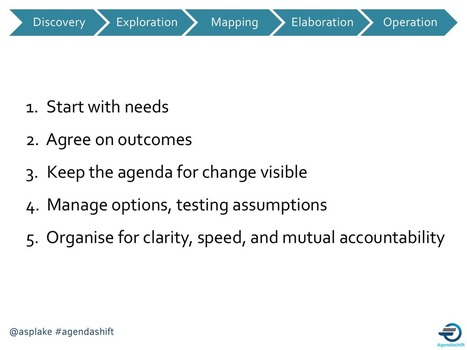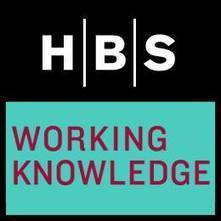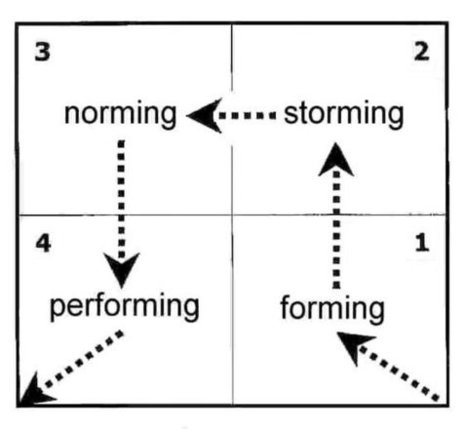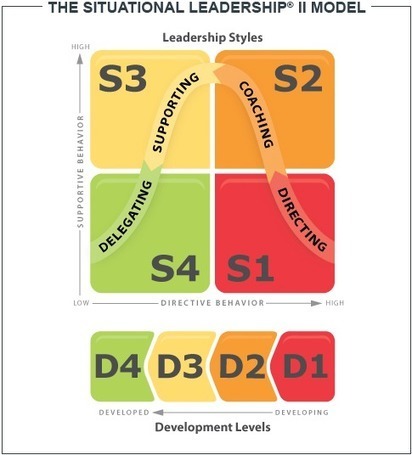 Your new post is loading...
 Your new post is loading...

|
Scooped by
Mickael Ruau
July 18, 2019 2:12 AM
|
Mike CohnNorwegian Developer’s Conference6 June 2012Leading a Self-Organizing Team1

|
Scooped by
Mickael Ruau
July 5, 2019 4:12 AM
|
L’observation d’équipes hautement performantes révèle que la coopération effective découle, d’abord et avant tout, d’un état d’esprit et d’une culture du collectif qui placent chacun en acteur de la réussite collective. Cette coopération efficiente débute, le plus souvent, par un diagnostic partagé, une vision commune des enjeux et des opportunités de l’équipe. Elle s’ancre dans une direction et s’établit au sein d’un cadre clair alimentant la volonté des acteurs d’aboutir à des solutions et à des propositions coélaborées qui dépassent ce que pourrait proposer l’un ou l’autre des membres de l’équipe, seul de son côté. Elle se mesure aux résultats effectifs, dont chacun peut être fier parce qu’il se sait reconnu à hauteur de la contribution qu’il y aura apporté.

|
Scooped by
Mickael Ruau
July 3, 2019 11:39 AM
|
Bruce Tuckman's model helps you to help your new team become effective, quickly, by understanding the stages of team formation.

|
Scooped by
Mickael Ruau
July 1, 2019 11:25 AM
|
In 2016 I made a series of leadership mistakes that could have been avoided if I had seen the warning signs, kept the ego in check and exercised some humility. The Storming stage was stuck on repeat and the rest of the team was walking on eggshells.

|
Scooped by
Mickael Ruau
July 1, 2019 6:02 AM
|
Tuckman's Team & Group Development Model is fascinating because it helps with understanding the 4 stages of development ANY team or group goes through.

|
Scooped by
Mickael Ruau
June 15, 2019 6:10 AM
|
Si vous voyez de ma part une liste de 5 choses, il y a des chances pour que cela corresponde aux 5 parties d’un workshopAgendashift – Découverte, Exploration, Mapping, Elaboration, Mise en oeuvre – et aux 5 chapitres de la partie 1 du nouveau livre. Voici donc Agendashift en 5 principes : - Commencez par les besoins
- Entendez-vous sur les résultats
- Gardez l’agenda du changement visible
- Gérez les options, vérifiant les suppositions
- Organisez vous pour plus de clarté, de rapidité et de responsabilité mutuelle
Vous pouvez lire ces derniers comme 5 principes de Leadership du Changement du 21ème siècle ou 5 principes d’adaptabilité organisationnelle.

|
Scooped by
Mickael Ruau
May 22, 2019 12:17 PM
|
Episode 1 in this series addressed being authentic with yourself and your own life, and Episode 2 addressed being authentic with others. In this Episode, I now help you as a leader explore being authentic with teams and organizations, being cause in the matter with them and enabling them to “occur”. Nothing worthwhile is ever accomplished on your own,…

|
Scooped by
Mickael Ruau
May 7, 2019 4:15 AM
|
work units at the 99th percentile have
4X
the success rate compared with those at the 1st percentile.

|
Scooped by
Mickael Ruau
April 30, 2019 4:08 AM
|
scientific studies have proven that when people experience positive emotions, they…
…see more possibilities.
…are more creative.
…are more resilient.
…perform better.
…are more inclusive of others.
…see more connection and overlap.
…come up with more ways to help.
…have more oneness.
…have more trust.
Regardless of what methodology or industry you are in, I’m thinking that the impact of increasing ANY of these things in our organizations would be a good thing and imagine the possibilities if we could see most of them happening. Powerful stuff…be positive.

|
Scooped by
Mickael Ruau
April 15, 2019 3:22 AM
|
According to Bruce Tuckman, there are 5 stages of group development: Forming – Storming – Norming – Performing- Adjourning.
The first one, the forming stage, represents the time when the group is just starting to come together and is characterized by anxiety and uncertainty. The focus for the group members during the forming stage is to become familiar with each other and their purpose, not focus on work.
We can help an Agile team pass this stage faster by:
- Gaining an understanding of the group's purpose
- Determining how the team will be organized and who will be responsible for what
- Outlining general group rules
Here is an example of a plan for a workshop which can be run to achieve these objectives.
Who should be there?
The entire team – every team member and contact from the business side. If someone cannot make it then find a different date – it is very important that everyone has a say.
How much time do we need?
This workshop is usually about 5 or 6 hours long, depending on team size.
What can help and has to be done?
Running a forehand training like this is beneficial. Such training introduces the team to agile terms and frameworks and helps everyone to be on the same page.
At least agile simulation workshop

|
Scooped by
Mickael Ruau
March 31, 2019 3:23 AM
|
The book Humble Leadership by Edgar and Peter Schein explores how building personal relationships and trust gives way to leadership that enables better information flow and self-management. The authors argue that we already possess the skill to form personal relations, and suggest using them to build and strengthen relationships with the people we lead and follow.
InfoQ readers can download a sample of Humble Leadership.

|
Scooped by
Mickael Ruau
March 29, 2019 3:14 AM
|
This presentation is based on L.David Marquet's book, "Turn the Ship Around", a semi-autobiography on how he managed a crew of 135 men in a $2 billion nuclear submarine. Empowering your staff to become an elite in their career path can be an almost impossible process - quite akin to leading a horse to water. Marquet details the four elements of what it takes to truly and permanently guide your team mates into transforming their outlook on work in a very meaningful, effective way.

|
Scooped by
Mickael Ruau
March 27, 2019 7:00 AM
|
arlier this year, I published 9 blog posts walking through an Agile Leadership Engagement Model. You can now download all 9 posts in one convenient document.
|

|
Scooped by
Mickael Ruau
July 16, 2019 5:21 AM
|
As Linda Hill sees it, innovation requires its own brand of leadership. The coauthor of the new book ''Collective Genius'' discusses her research on 16 of the best business innovators.

|
Scooped by
Mickael Ruau
July 4, 2019 11:43 AM
|
Qu'est-ce qui fait qu'une équipe performe dans la bonne humeur ? Attention au piège : ce n'est pas parce qu'elle est composée des meilleurs collaborateurs ! Je vous propose dans cet article un outil de coaching pour diagnostiquer et améliorer la dynamique d'une équipe

|
Scooped by
Mickael Ruau
July 2, 2019 12:05 PM
|
A game to explain the Tuckman model, Dr. Bruce Tuckman's 4-stage model for teams.

|
Scooped by
Mickael Ruau
July 1, 2019 6:05 AM
|
This article explores how a leader can aid group development and increase team success using Tuckman’s and Belbin’s group theories.

|
Scooped by
Mickael Ruau
June 18, 2019 10:33 AM
|
1. Selfless
Let’s all learn from Mr. Dunn’s leadership and what it means to give away a personal ego for a larger purpose. Despite making millions in the NFL, Mr. Dunn has chosen to invest his good fortune into others…lifting struggling single parents to new heights. What does it take for each of us to give away our personal egos at work, so we can mentor and grow others to become better than us?
2. Courageous
Imagine the level of courage Mr. Dunn showed in 1993 as he faced the loss of his only parent. His newfound Father figure responsibilities would’ve overwhelmed almost anyone, but not Warrick Dunn. He faced the moment with the courage to move forward, and look at where that took his life journey.
Workplace courage pales in comparison, but it’s still an essential element of real leadership in an organization. Exemplifying courage allows you to create conditions where your teammates can speak freely when it matters most. What challenges do you face at work? Are there certain situations where you feel scared to tell the truth? Courage is your ability to confront those fears directly, so you can lead your organization toward its larger goals on a daily basis.
3. Focused
Great leaders inspire others, but this inspiration is razor-focused on a shared purpose – which is the vision & mission of the organization. One look at Mr. Dunn’s charity website and you’ll feel the purpose that it serves. In your organization, great leaders understand how to translate the vision & mission into a focused set of business objectives that people achieve…not because they have to, but because they WANT to.
4. Humble
Mr. Dunn does not garner the spotlight. He celebrates the continued success of his work by deflecting the praise toward his charity’s Board of Directors (who are also quite inspiring people). This is a profound trait of great leaders; the ability to melt behind the scenes as others are celebrated for their success.
5. Masters of Their Craft
Great leaders bring a deep level of skills, knowledge and experience in an organization. Like Mr. Dunn, real leaders have lived in the arena (and might still play in the arena), and they use their knowledge and experience to thoughtfully mentor and grow others toward their full potential.

|
Scooped by
Mickael Ruau
June 11, 2019 1:37 AM
|
Je fais du développement en environnement professionnel depuis maintenant une dizaine d’années. Dans toutes les organisations et les équipes où j’ai pu travailler, j’ai été confronté à des "crises". Parfois venant de problèmes dans les solutions, parfois simplement politiques, parfois "fantasmées", elles ont

|
Scooped by
Mickael Ruau
May 10, 2019 12:13 PM
|
Le mardi 2 avril, notre partenaire Help Business était au Village pour échanger avec les startups sur le sujet de la gestion d’équipe. La conférence était animée par Bruno Rollin, Dirigeant et coach…

|
Scooped by
Mickael Ruau
April 30, 2019 11:11 AM
|
Prof. Mihaly Csikszentmihalyi, author of the global best-seller book Good Business, conducted deep interviews with several leaders of internationally successful, and sustainable organizations. He found that these successfully created Flow-promoting Organizations and implemented the Flow-Leadership style. Together with him, our team at Aleas Sims/FLIGBY has identified a core of 29 management and leadership skills. In cooperation with…

|
Scooped by
Mickael Ruau
April 17, 2019 3:38 AM
|
Real teams have clear boundaries, interdependence among members and stability; a clear and challenging purpose; a structure that enables teamwork; resources and support; and competent coaching.

|
Scooped by
Mickael Ruau
April 13, 2019 4:21 AM
|
Les leaders authentiques sont des personnes sincères et fidèles à ce en quoi elles croient », a déclaré Bill George à HBR. «Ils ont du courage, de la compassion, de l’empathie – des qualités de cette nature – et ils construisent des relations solides à long terme».

|
Scooped by
Mickael Ruau
March 29, 2019 3:30 AM
|

|
Scooped by
Mickael Ruau
March 28, 2019 2:25 AM
|
Frances Hosking and Anita Kim discuss how The Economist Digital Leadership Team has been working to revitalize and empower their teams using a specific Insight Facilitation strategy technique.
|
 Your new post is loading...
Your new post is loading...
 Your new post is loading...
Your new post is loading...



























